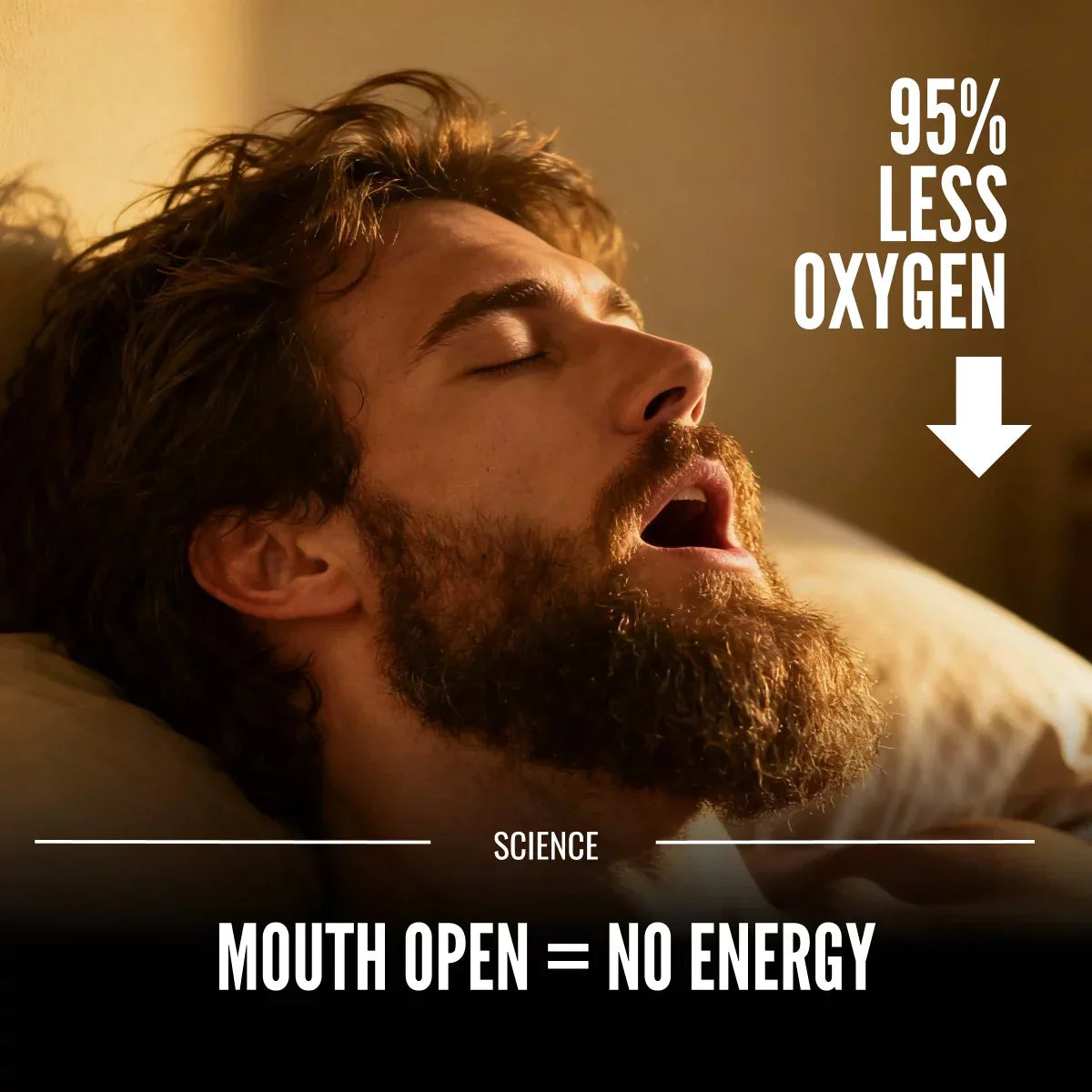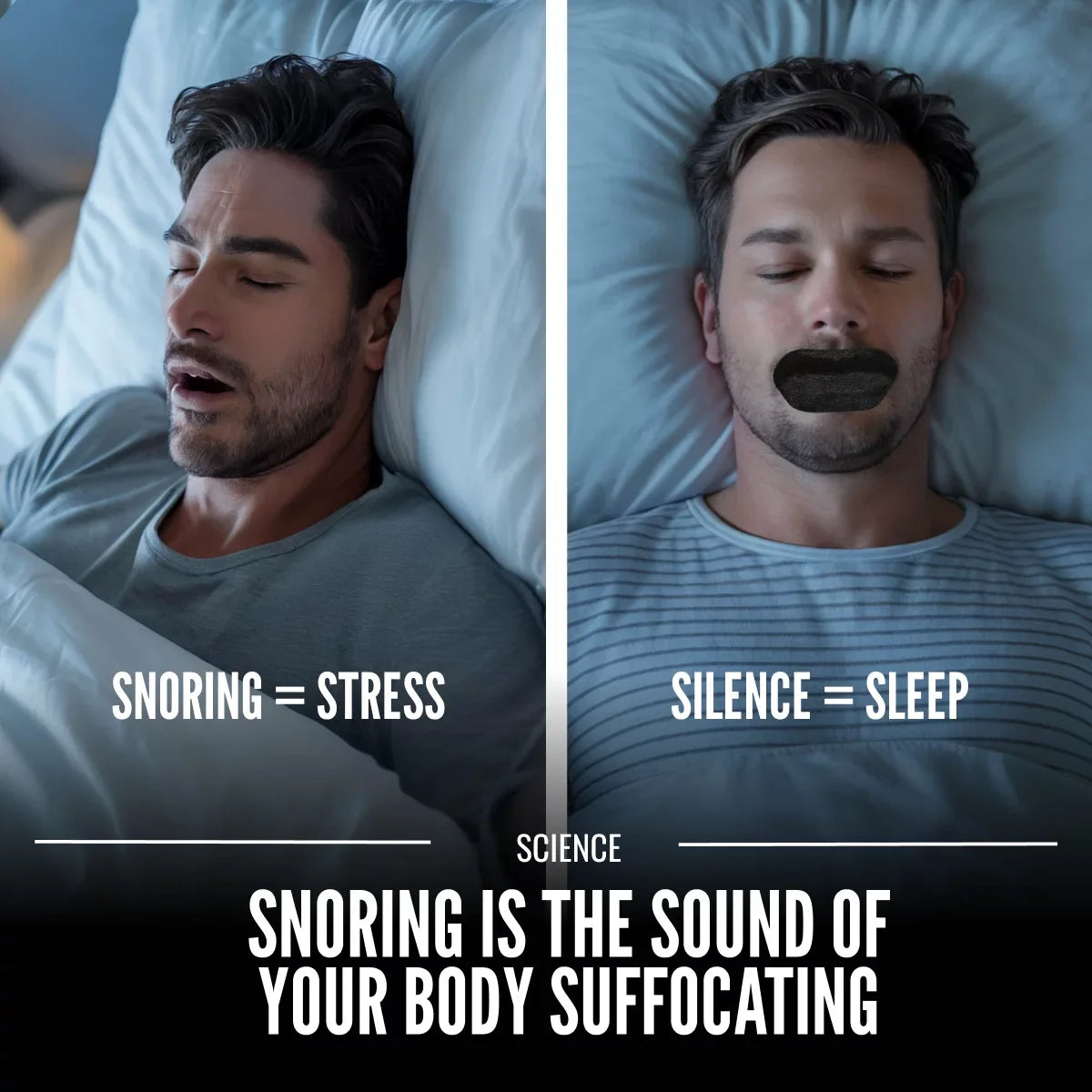You wake up groggy. Again.
Your mouth feels like someone stuffed it full of cotton balls and regret.
You stumble to the bathroom, stare at yourself in the mirror, and think,
“Did I get hit by a truck in my sleep… or was I just breathing through my mouth again?”
Spoiler: it’s the second one. And it’s not just your dry mouth that’s paying the price.
Mouth breathing may be quietly wrecking your brain.
Not in a dramatic, sci-fi brain-melting kind of way—but in a slow, subtle, daily sabotage that leaves you foggy, fried, and just a little more forgetful than yesterday.
Let’s break it down: what we know about how mouth breathing affects the brain—and how to stop letting bad sleep hold your mind hostage.
Your Nose Is a High-Tech, Underused Superpower
Your nose isn’t just there to hold up your sunglasses.
It’s a breathing machine with built-in filtration, humidification, and a bonus feature called nitric oxide—a molecule that helps dilate blood vessels and improve oxygen delivery.
Nasal breathing = smooth, efficient oxygenation.
Mouth breathing = chaos.
When you breathe through your mouth, you bypass all that science and send cold, dry, unfiltered air straight down the hatch.
Your oxygen intake suffers.
And when your brain doesn’t get enough oxygen, it starts to act like it’s trapped in a sleep-deprived interrogation room.
What Mouth Breathing Might Be Doing to Your Brain
1. Starving Your Brain of Oxygen (a Little Bit Every Night)
Your brain is a diva. It only makes up about 2% of your body weight, but demands 20% of your oxygen. When you breathe through your mouth—especially during sleep—you’re delivering less oxygen with each breath.
Over time, this can lead to intermittent hypoxia—low oxygen levels that impair:
-
Memory
-
Focus
-
Reaction time
-
Your ability to remember why you walked into the kitchen
A study in Respiratory Physiology & Neurobiology found that kids who mouth breathe regularly have lower cognitive function and academic performance.
Adults? Same story, just with higher stakes and fewer excuses.
2. Trapping You in a State of Stress and Anxiety
Mouth breathing doesn’t just sabotage your oxygen levels—it hijacks your nervous system.
When you mouth breathe, you’re signalling your body to stay in fight-or-flight mode. That’s great if you’re outrunning a bear. Terrible if you’re just trying to fall asleep or answer emails without punching your laptop.
Nasal breathing, on the other hand, activates your parasympathetic nervous system—aka calm mode. It tells your body, “Hey, the apocalypse isn’t happening. You can chill now.”
If you’re waking up anxious, wired, or ready to scream at someone for chewing too loudly, your mouth might be the real problem—not your personality.
3. Is Mouth Breathing Linked to Dementia? Maybe. Maybe Not. But Do You Want to Risk It?
Let’s be clear: mouth breathing alone doesn’t cause dementia.
But if it’s paired with poor sleep, snoring, or sleep apnea, it can lead to chronic oxygen deprivation, which has been linked to memory loss and cognitive decline.
A JAMA Neurology study found people with untreated sleep-disordered breathing had higher rates of mild cognitive impairment and dementia later in life.
Translation? If your mouth is wide open all night, your brain might be aging faster than it should. And not in the wise-and-witty way—in the where-are-my-keys-again way.
The Real Danger? Mouth Breathing While You Sleep
During the day, you can catch yourself. You notice your mouth is open, you course-correct, and carry on.
But at night? You’re unconscious. Your jaw drops open like a broken puppet, and the sabotage begins.
Mouth breathing during sleep leads to:
-
Snoring
-
Fragmented sleep
-
Lower oxygen saturation
-
Brain fog so thick it feels like you’ve been rebooting all morning
That’s where Hostage Tape comes in.
Our mouth tape isn’t some delicate sticker—it’s sleep armor. It gently (but firmly) keeps your mouth shut so your body is forced to do what it was built to do:
Breathe through your nose.
Don’t let bad sleep (or snoring) from mouth breathing hold you or your partner hostage.
Hold your brain—and your sleep—hostage instead. With Hostage Tape, you’re in control now.
How to Break the Brain Fog Cycle
1. Use Your Nose During the Day
Train yourself to nasal breathe during workouts, while walking, even during stressful moments. Bonus: you’ll look way more composed than the open-mouthed breathers around you.
2. Clear Your Nose Before Bed
Rinse with saline. Take a hot shower. Hum a little. Whatever it takes to open up your airways before lights out.
3. Tape Up with Hostage Tape at Night
No frills. No fluff. Just your mouth, sealed shut, and your nose doing what it was built to do. Our tape stays put all night, even if you toss and turn like a caffeinated toddler.
4. Track the Difference
Less brain fog. More clarity. Fewer “What was I saying again?” moments. You’ll know it’s working when mornings don’t feel like a recovery mission.
Final Thoughts: Don’t Let Your Mouth Play Mind Games
Your mouth doesn’t care about your future.
It doesn’t care about your sleep quality, your memory, or your mental clarity. It just flops open and makes things worse.
But you? You’re smarter than your mouth. And you know your brain deserves better.
Start nasal breathing. Use Hostage Tape. Give your brain the oxygen it craves and the sleep it’s been begging for.
Shop Hostage Tape now and stop letting your mouth hijack your mind.
Want more insight? Check these out next:
Breathe better. Sleep deeper. Think sharper.
And stop waking up like your brain’s been held for ransom.






Share:
Breathe Right, Sleep Tight: How Nasal Breathing Unlocks Deep, Restorative Sleep
Can Nose Breathing Fix a Deviated Septum? Or Are You Just Built Crooked Forever?